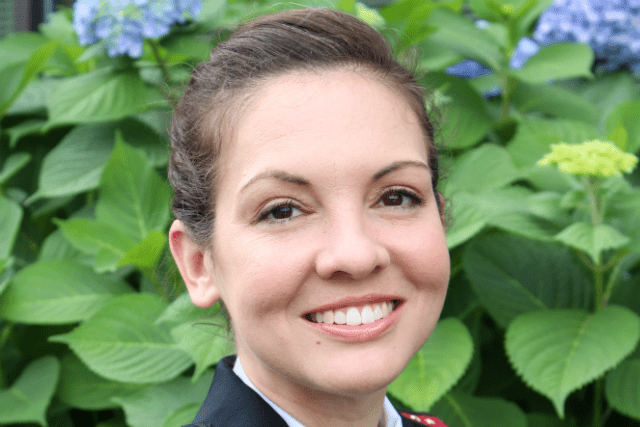New Director of Special Needs Ministries to shine light and hope on families in need
By Kristin Marguerite Doidge –

For the 7 million families across the United States whose children or dependants have disabilities, finding hope amid a diagnosis can often be a challenge.
Enacted in 1975, the Individuals with Disabilities Education Act (IDEA), formerly known as the Education for All Handicapped Children Act, mandates the provision of a free and appropriate public school education for eligible students ages 3 to 21. Eligible students are those identified by a team of professionals as having a disability that adversely affects academic performance and as being in need of special education and related services, with about a third of them experiencing a specific learning disability, according to the National Center for Educational Statistics.
That means accessibility has been greatly improved for young people of all backgrounds and abilities during the school week—but what about on Sundays?
“The fact that many special needs families cannot, or will not attend church services is devastating,” said Captain Christina Arnold, newly appointed Director of Special Needs Ministries for the Western Territory. “Families who desperately need the love of God and fellowship with believers are not getting the opportunity to connect with a Christian community because many churches and programs are not suited to care for the higher needs family members.”
Helping to make church programs more inclusive is just one of the many reasons why Arnold is looking forward to her new role, serving as a beacon of hope and light as someone who knows personally what it’s like to crave connection during crisis.
She grew up in The Salvation Army going to corps programs and started working full-time in youth ministry at the age of 18. After she married her “camp sweetheart,” they became cadets in 2010.
They also became parents to two boys.
“While in training to become Salvation Army officers, it became apparent that one of our sons processes and responds to the world around him differently,” Arnold said. “While in pre-kindergarten, he was given an Individualized Education Program (IEP) which started us on this journey to help our son.”
In an effort to help him cope with the world around him, Arnold said he began several different therapies, requiring “so much time and emotions several nights a week.” It was then that she started to educate herself on ways The Salvation Army’s programs could help him and others like him.
Still, there were moments of darkness.
“My son was struggling and I was hurting,” she said. “I became more and more dependent on God’s grace to get us through the endless appointments.”
Through relationships with other families with special needs children, Arnold said she was able to witness the unique transformation that happens when Christ enters the heart of the caregivers.
It’s that transformation that Envoy John Stennett hopes Arnold will bring to even more families in her new role.
“I am happy that we will have an officer focused on our neighbors with special needs,” said Stennett, Social Services Secretary for the Western Territory. “We want to always make sure our services are accessible and effective for all of our neighbors. Having an advocate at Territorial Headquarters will ensure that their needs are not ignored.”
To that end, Arnold pointed out that The Salvation Army “has a powerful history of reaching out to the marginalized with the love of God,” noting that around the world, Salvation Army corps have developed a number of innovative programs to reach groups who might otherwise be overlooked.
But more work needs to be done, she said. While most churches are exempt from the Americans with Disabilities Act (ADA), the spirit of the ADA aligns with the standards by which most congregations worship. “That All May Worship: An Interfaith Welcome to People with Disabilities,” a guide published by the American Association of People with Disabilities, offers guidelines to help transform congregations of all faiths into places where children and adults with disabilities “are welcomed, honored, and enjoyed.”
For Arnold, true inclusivity means welcoming all, including those with a variety of disabilities. She was reminded of this need on a recent visit to the doctor’s office with her husband about her son’s progress.
“At the end of our meeting, the doctor commented on how refreshing it was for her to see parents with hope,” Arnold said. “She said so many families she meets seem to be hopeless with their child’s prognosis. We were able to share that our hope comes from our faith in God, and how we know God is working in our son.”












I an a solider I been a solider active in Corp through out my life I was led by the Lord to MINISTRY LEADER OVER 10 YEARS FOR SPECIAL NEED PERSON SUNDAY SCHOOL AND CHURCH SERVICE PEOPLE TALK ABOUT IT ALL LOVER THE CENTRAL VALLEY I HAD TO FIGHT FOR GOD PEOPLE MY YOUNG GRANDDAUGHTER HELP WE DID THE WHOLE THING THEY WERE A BLESSING TO SERVE
SOLDIER MERCED CA
I an a solider I been a solider active in Corp through out my life I was led by the Lord to MINISTRY LEADER OVER 10 YEARS FOR SPECIAL NEED PERSON SUNDAY SCHOOL AND CHURCH SERVICE PEOPLE TALK ABOUT IT ALL LOVER THE CENTRAL VALLEY I HAD TO FIGHT FOR GOD PEOPLE MY YOUNG GRANDDAUGHTER HELP WE DID THE WHOLE THING THEY WERE A BLESSING TO SERVE
SOLDIER MERCED CA